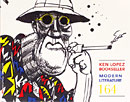Catalog 164, A

2. ANDERSON, Kent. Review File. c. 1987-1988. Anderson's own collection of reviews of his first book, the powerful Vietnam novel Sympathy for the Devil, together with articles by him and about him from about the same time period. Roughly 14 different pieces, all photocopies, but five of them have holographic comments by Anderson on them. Includes copies of both Gustav Hasford's and Harry Crews's submissions for publicity blurbs for Sympathy for the Devil. Anderson has annotated Hasford's with news of Hasford's subsequent memorial service, and signed the annotation in 1993. All items fine.
3. ANDERSON, Kent. Defense of Faculty Reviews. 1992. A 7-page dot-matrix print-out of a letter by Anderson defending himself against a series of complaints made against him as a faculty member at Boise State University. Together with an unsigned cover letter from 1993 expressing, among other things, a wish he could publish the letter and a tirade against "the new thing, the E-mail," and its allowing people to hide behind a curtain like the Wizard of Oz. Also together with four of Anderson's reviews as a faculty member, three of which have Anderson's holograph annotations (e.g., "don't know how she got this guy in her pocket"). And also together with, and paper-clipped to his faculty reviews, the Pablo Neruda poem "Guilty," on which Anderson has written: "I make my 'Creative Writing' students memorize this for their mid-term." Not signed on the preceding items, but with a 1993 letter of transmittal signed by Anderson, saying, among other things, that he expects he'll be in Boise a few more years "before [they] manage to get rid of me." Rust from paperclips; otherwise all items fine.
4. ANDERSON, Kent. Typescript of Night Dogs. 1993. Anderson's dot-matrix printout of a draft of what became the prologue and first chapter of his second novel. 24 pages, with extensive differences between this version and the published version. With a handwritten signed note by Anderson across the top of the first page, saying, in part, that he thinks the novel will be finished in another six weeks. Night Dogs was one of the most eagerly awaited novels of its time, but its publication was delayed as different publishers vied for it but no deal was reached for the publication rights. It was finally published in 1996 by Dennis McMillan, a small press/fine press publisher, primarily of limited editions. Later, in 1998, there was a publication by a major trade publishing house, Bantam, which had merged with Doubleday, the publisher of Anderson's first novel. This is a very early segment of the work-in-progress. Marked by a rusty paper clip, else fine.
5. (Anthology). The Best Short Stories 1939. Boston: Houghton Mifflin, 1939. With contributions by John Cheever, Eudora Welty -- preceding both their first books -- Robert Penn Warren, Richard Wright, Robert M. Coates, William Saroyan, Meridel LeSueur, and others. Edited by Edward J. O'Brien. Bookplate of screenwriter and film director Leo McCarey on the front pastedown and offsetting to the front flyleaf from same; near fine in a bright, very good dust jacket with rubbing to the edges and folds. It's anecdotal, but when we were compiling a full set of The Best American Short Stories, it was this volume that proved the most elusive.
6. American Negro Poetry. Arna Bontemps, ed. NY: Hill & Wang [1963]. The uncorrected proof copy of this anthology edited by Arna Bontemps, with poetry by Langston Hughes, Sterling Brown, Jean Toomer, James Weldon Johnson, Richard Wright, Clarence Major, Robert Hayden, Paul Laurence Dunbar, Margaret Walker, Gwendolyn Brooks, Clarence Major, Frank Yerby, Bontemps himself, and many others. Tall, comb-bound galley sheets, without the Bontemps introduction that appeared in the published text. Publicity information taped inside the front cover; this may be what was once tipped to the front cover and is now absent. Minor sunning and creasing, with a couple small tears; a very good copy. The format suggests that only a small number would have been produced, and in this era proofs such as this were not routinely a part of the publication process. This is the only copy we have seen of the proof of this landmark collection, published at the dawn of the Civil Rights era.
7. ATWOOD, Margaret. "The Handmaid's Tale - Before and After" in The Handmaid's Tale Film Press Kit. (Toronto): Nova Entertainment/VK & Associates, 1990. A two-page essay by Atwood on what she feared would happen upon the book's release, how her fears didn't materialize, and how that just made her more fearful. Included within the press kit for the 1990 film based on her 1986 classic dystopian novel, which featured a screenplay by Harold Pinter and starred Natasha Richardson, Faye Dunaway, Robert Duvall, Elizabeth McGovern, and Aidan Quinn. Also included are the usual synopsis, production notes, cast and credits, press release, and an issue of Cinefantastique (March 1990), which has the story of the making of The Handmaid's Tale as its cover article. Corner crease to the title page of the stapled packet that includes Atwood's essay, else all items fine in a glossy cardstock studio folder. As best as we can tell, this essay has not been published elsewhere.